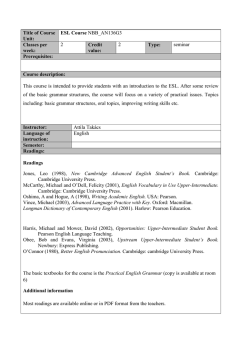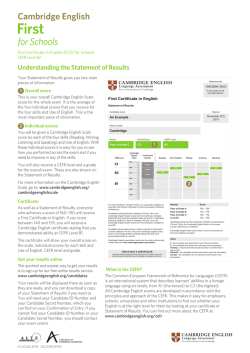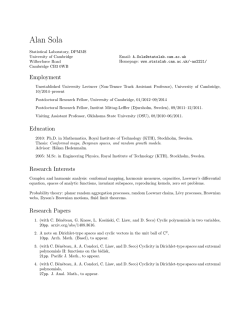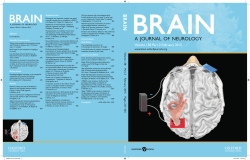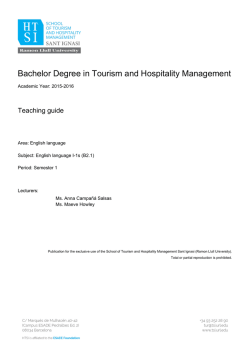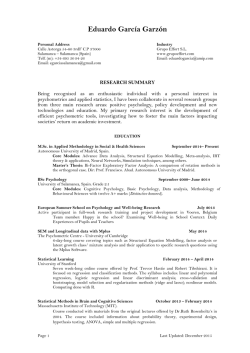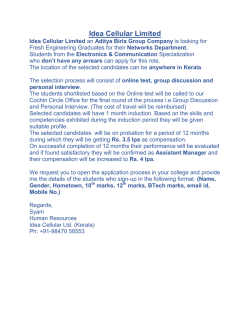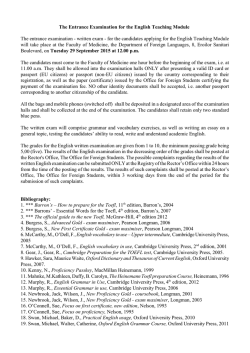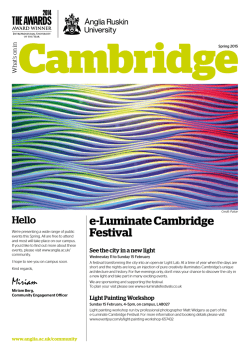
Newsletter International Examinations Department
Contents Cambridge English Exams _ news 1. Cambridge English certificates on LInkedIn 2. Cambridge English Exams are accepted for UK University Degree courses Cambridge English Scale: More exams added 3. Converting practice test scores to Cambridge English scale scores 4. Cambridge English Scale factsheet 5. Ban on mobile phones and electronic devices 6. Anticheating poster 7. Resources: Bring football into your classrooms New Webinar from Cambridge: Understanding Assessment Sing and Learn: New resources for young learners Testbank: authentic practice tests now online New classroom tool: Prepare for Presentation Plus 8. Fees section: Trinity GESE and ISE 2016 fees Cambridge English – May/June 2016 fees 9. Cambridge English – Exam dates and enrolment periods for Second Semester A WINDOW TO THE WORLD (INTERNATIONAL EXAMS) MARCH 2016 - ISSUE 26 3 Dear Colleagues, Hope you´ve all had a most relaxing and enjoyable Summer break, which, I know, every year it seems to go by faster and faster…we´re all in the same boat here. Anyway, this is a very special year – a leap year, which occurs once every four years and as such, it should be celebrated. There are also legends and superstitions around the Leap year but we are determined to make it special in a positive way so get ready to leave a new print. For this purpose, I have included lots of useful information from Cambridge English, the range is vast – from information on the Cambridge Scale to classroom resources and exam dates and fees. Also, ISE can now be taken in modules – Speaking & Listening, Reading & Writing or the usual Full ISE. The fees for these components are included in the newsletter to help you organize and motivate your students. This is ideal for those students who need an extra push before achieving a higher level. So, to round up, I leave you with some food for thought … Where does the phrase leap year come from? In 365-day years, known as common years, fixed dates advance one day in the week per year. For example, Christmas fell on a Thursday in 2014 and on a Friday in 2015. With the insertion of a leap day, dates (following February) advance two days instead of one. In 2016, Christmas will leap over Saturday to fall on a Sunday. Will you be celebrating leap day in anyway? This could be a good topic to fire up a discussion with your students. Have a good start! All the best Monica León Dickens Institute International Examinations Manager DICKENS INSTITUTE (21 de Setiembre 2744) CP 11300 Montevideo – Uruguay Tel: +598 - 2710 75 55 ext 123 A WINDOW TO THE WORLD (INTERNATIONAL EXAMS - MARCH 2016 - ISSUE 26 Cambridge English certificates on LinkedIn have launched Cambridge English has been working with LinkedIn to develop a new way to promote Cambridge English certificates and qualifications to future employers, colleagues and LinkedIn connections. Learners and teachers can now add their certificate or qualification to their LinkedIn profile, and we would like your help to promote this new feature. You can add it to your profile by simply choosing the Add to profile button on our website. Recognising organisations can verify qualifications using our Online Verification Service. Cambridge English exams are accepted for UK University Degree courses Cambridge English: Advanced and Proficiency can be used to apply to universities for degree courses (or higher), where these exams are accepted. It is important that you and your preparation centres continue to recommend these exams for study at UK universities. Candidates from outside the EU who need to apply for a Tier 4 visa to study at degree level and above at a Tier 4 Sponsor university, are only required to present the proof of English language level that the university requires; UKVI does not require them to have taken a test from the UKVI list of Secure English Language Tests (SELT tests). For courses below degree level, universities need to accept an approved SELT from international applicants. IELTS is included on UKVI’s SELT list. For UK visa and immigration purposes, IELTS will need to be taken under SELT conditions at approved centres. Further details about using Cambridge English exams for UK university admissions can be found in this FAQ . Your students can find further information about studying in the UK here. If you have any questions regarding UK university recognition, do get in touch. Cambridge News: More exams added to the Cambridge English Scale In January 2015, we launched a new way of reporting results for our exams – the Cambridge English Scale. We are now pleased to inform you that from February 2016 the Cambridge English Scale will also apply to Cambridge English: Key, Key for Schools, Preliminary, Preliminary for Schools, Business Preliminary, Vantage and Higher. To help you explain the changes to your candidates, we have created: o a free downloadable factsheet o an online tool that makes it easy to convert and compare Cambridge English Scale scores to standardised scores and IELTS scores o a short explanatory video. Find out more at www.cambridgeenglish.org/cambridgeenglishscale. A WINDOW TO THE WORLD (INTERNATIONAL EXAMS) MARCH 2016 - ISSUE 26 5 Important News: Cambridge English Ban on mobile phones and electronic devices from 2016 This is a reminder that from January 2016, candidates will not be permitted to take their mobile phones or any other electronic devices into the exam room or the Speaking test. Electronic devices include iPods, iPads, ereaders, laptops and any other device on which notes could be accessed, data received or transmitted during an exam session. This decision was made taking into account the growing threat of mobile technology and prevailing policy of other exam boards around the world. Some centres already comply with these regulations and from 2016 we will be enforcing them worldwide. From January 2016, any candidates found with mobile phones or other electronic devices in their possession in an exam room will be disqualified. A WINDOW TO THE WORLD (INTERNATIONAL EXAMS - MARCH 2016 - ISSUE 26 Anti-cheating poster Cambridge English have now added this new poster: the Anti-cheating poster. Students will see it displayed on walls around the exam area. Please do show it to your students, Cambridge would like all teachers to emphasise the consequences of cheating making sure your candidates are aware of the consequences of cheating during a Cambridge English exam. A WINDOW TO THE WORLD (INTERNATIONAL EXAMS) MARCH 2016 - ISSUE 26 7 Bring football into your classrooms! Do your students know their defenders from their strikers? Make learning English fun through the world’s favourite game – football. Play our fun English language game, Cambridge English FC for free. Download Cambridge English FC for free As the captain of Cambridge English FC football team, your students must answer English grammar and vocabulary questions. This will help their team pass the ball, get to the goal, shoot and score. They must know their grammar or they’ll face being sent to the bench! There are three cups to play for and students progress through each round, unlocking harder questions as they go. Games are a great way to help your students practise and improve their English in a fun, motivating way. Cambridge English FC is for students at CEFR levels B2–C1 so is suitable for those studying for Cambridge English: First, First for Schools and Advanced. The multiple-choice questions test English language skills such as grammar, vocabulary and pronunciation. The game is available for free for iOS and Android devices. New webinar from Cambridge English Understanding assessment – what every teacher should know Teachers need to understand what makes a good test but many teachers are unsure of the key concepts and specialised technical vocabulary associated with Assessment Literacy. This webinar explains in everyday language what teachers need to know about key areas of test design. The presenters also focus on how testing relates to the classroom, and how testing leads to effective teaching and learning. This and all of Cambridge webinars are now available on our YouTube channel CambridgeEnglish TV. A WINDOW TO THE WORLD (INTERNATIONAL EXAMS - MARCH 2016 - ISSUE 26 Sing and Learn – New resource for young learners Sing and Learn is our new series of videos for young learners, designed to help them learn, remember and use new language. The videos include simple action songs with the words displayed on screen for children to follow and sing along to. Each video also comes with downloadable activity sheets. The activity sheets provide notes for parents and teachers and themed reading and writing activities, all based on the vocabulary, grammar and structures used in the song lyrics. Songs are a great way to add fun to children’s learning and they can also help them practise their pronunciation. Sing and Learn uses the tunes of popular children’s songs but includes words taken from the word lists used to create our Cambridge English: Starters and Movers tests. Do go ahead and use these videos in the classroom and keep parents informed of the resources available in the Parents and children section on our website. A WINDOW TO THE WORLD (INTERNATIONAL EXAMS) MARCH 2016 - ISSUE 26 9 Testbank – new authentic practice tests now available! Online practice tests are now available for Cambridge English: Key and Cambridge English: Preliminary Testbank is also available for the following exams: o Cambridge English: Key for Schools o Cambridge English: Preliminary for Schools o Cambridge English: First for Schools o Cambridge English: First o Cambridge English: Advanced Visit the website to find out more. Practice makes perfect! Cambridge English News: Prepare for Presentation Plus! Presentation Plus is an all-in-one classroom presentation tool that makes all of the course materials available at the touch of a button. It’s now available for our brand new schools course, Prepare! Now being used in over 28 countries worldwide, Prepare! provides both General English and Cambridge English for Schools exam preparation. Watch our video and find out more about the course and its innovative digital tools. A WINDOW TO THE WORLD (INTERNATIONAL EXAMS - MARCH 2016 - ISSUE 26 The Cambridge English Scale explained A guide to converting practice test scores to Cambridge English Scale scores Common European Framework of Reference (CEFR) Cambridge English Scale Cambridge English: Key Cambridge English: Preliminary Cambridge English: First Cambridge English: Advanced Cambridge English: Proficiency Cambridge English: Business Preliminary Cambridge English: Business Vantage Cambridge English: Business Higher 230 Grade A Proficient user 220 C2 Grade B 210 Grade A 200 C1 Grade A Independent user Distinction Basic user A2 Distinction 130 Grade A Grade C Pass Grade C Grade B Level B2 Merit 150 140 Grade C Grade B Level C1 Grade B 170 160 B1 Grade A Grade B 190 180 B2 Grade C Distinction Grade C Level B2 Merit Level B1 Pass Level B1 Merit Pass Level A2 Level A2 120 A1 110 Level A1 100 Below A1 90 80 Most Cambridge English exams are now reporting results on the Cambridge English Scale. * across the whole test, and there is no requirement to achieve a minimum score in each paper. For Cambridge English: First, First for Schools, Advanced and Proficiency, candidates receive an individual score for each of the four skills – reading, writing, listening, speaking – and Use of English. In the live exams, each of the skills and Use of English are equally weighted, and a candidate’s overall score is calculated by adding all of the individual scores together and dividing by five (and then rounding to the nearest whole number). The following tables can be used as guidance to help you convert practice test scores to Cambridge English Scale scores. IELTS is mapped to, but will not be reported on the Cambridge English Scale For Cambridge English: Preliminary, Preliminary for Schools, and Cambridge English: Business Certificates (Preliminary, Vantage and Higher), candidates receive an individual score for the four skills – reading, writing, listening and speaking. In the live exams, each skill is equally weighted, and a candidate’s overall score is calculated by adding all of the individual scores together and dividing by four (and then rounding to the nearest whole number). For Cambridge English: Key and Key for Schools, candidates receive an individual score for each paper in the exam – Reading and Writing, Listening and Speaking. In the live exams, the Reading and Writing paper tests two skills so the score is doubled. A candidate’s overall score is calculated by adding all of the individual scores together and dividing by four (and then rounding to the nearest whole number). A candidate’s grade and CEFR level are based on their performance Please note that these only apply when using official Cambridge English practice tests. The conversion tables are intended to help you provide an indication of your students’ readiness to take the relevant exam. The scores you provide may not always reflect the results the students may achieve in a Cambridge English live exam. They should not be used to try to predict precise scores in the live exam, but can be a useful diagnostic tool, indicating areas of relative strength and weakness. The scores needed on any given test to achieve the scores on the Cambridge English Scale shown in the tables below will vary due to a number of factors, so scores close to CEFR boundaries need to be reviewed carefully. We recommend that this is approximately three Cambridge English Scale score points above and below the score needed to achieve the level, e.g. 157–163 for Level B2. Students who achieve only slightly higher than the Cambridge English Scale score for a given level on a practice test may not achieve that level in the live exam, and we recommend that they continue working to improve so that they reach the desired level. Converting practice test scores to Cambridge English Scale scores Reading and Writing The Reading and Writing paper consists of 9 parts. Correct answers in Parts 1–8 are worth 1 mark each and Part 9 is worth 5 marks. There are 60 possible marks in the Reading and Writing paper. Practice test score Cambridge English Scale score 55 40 25 13 140 120 100 82* CEFR Level Level B1 Level A2 Level A1 - *minimum score reported for Key Listening Correct answers in the Listening paper are worth 1 mark each. There are 25 possible marks in the Listening paper. Practice test score Cambridge English Scale score 23 17 11 6 140 120 100 82* CEFR Level Level B1 Level A2 Level A1 - *minimum score reported for Key Speaking Candidates take the test in pairs, but are assessed on their individual performance by trained examiners certificated to examine at the level. Candidate speaking performances are assessed using scales which are linked to the Common European Framework of Reference. The assessor gives 0–5 marks for each of the following criteria: Grammar and Vocabulary; Pronunciation; and Interactive Communication. Marks for each of these criteria are doubled. The interlocutor gives a mark of 0–5 for Global Achievement. This mark is then multiplied by three. Examiners may award half marks. Marks for all criteria are then combined, meaning there are 45 marks available in the Speaking test. Practice test score Cambridge English Scale score 41 27 18 10 140 120 100 82* CEFR Level Level B1 Level A2 Level A1 - *minimum score reported for Key Converting practice test scores to Cambridge English Scale scores Reading The Reading section consists of Parts 1–5 of the Reading and Writing paper. Correct answers in Parts 1–5 are worth 1 mark each. There are 35 possible marks in the Reading section. Practice test score Cambridge English Scale score 32 25 15 7 160 140 120 102* CEFR Level Level B2 Level B1 Level A2 - *minimum score reported for Preliminary Writing The Writing section consists of Parts 6–8 of the Reading and Writing paper. Candidates’ answers in the Writing paper are marked by trained examiners who are certificated to mark at the level. Correct answers in Part 6 are worth 1 mark each. Part 7 is marked using a short answer mark scheme and the total number of possible marks is 5. Part 8 is marked using assessment scales which are linked to the Common European Framework of Reference. 0–5 marks are given for each of the following criteria: Content; Communicative Achievement; Organisation; and Language. Whole marks only are awarded; there are no half marks given. Marks for each of the criteria are combined to give 20 possible marks for this part, weighted to 15. There are 25 possible marks for writing. Listening Correct answers in the Listening paper are worth 1 mark each. There are 25 possible marks in the Listening paper. Practice test score Cambridge English Scale score 23 17 11 6 160 140 120 102* CEFR Level Level B2 Level B1 Level A2 - *minimum score reported for Preliminary Practice test score Cambridge English Scale score 23 18 11 5 160 140 120 102* CEFR Level Level B2 Level B1 Level A2 - *minimum score reported for Preliminary Speaking Candidates take the test in pairs, but are assessed on their individual performance by trained examiners certificated to examine at the level. Candidate speaking performances are assessed using scales which are linked to the Common European Framework of Reference. The assessor gives 0–5 marks for each of the following criteria: Grammar and Vocabulary; Discourse Management; Pronunciation; and Interactive Communication. The interlocutor gives a mark of 0–5 for Global Achievement and this mark is doubled. Examiners may award half marks. Marks for all criteria are then combined, meaning there are 30 marks available in the Speaking test. Practice test score Cambridge English Scale score 27 18 12 7 160 140 120 102* CEFR Level Level B2 Level B1 Level A2 - *minimum score reported for Preliminary Converting practice test scores to Cambridge English Scale scores Reading The Reading section consists of Parts 1, 5, 6 and 7 of the Reading and Use of English paper. Correct answers in Parts 1 and 7 are worth 1 mark each. Correct answers in Parts 5 and 6 are worth 2 marks each. There are 42 possible marks in the Reading section. Practice test score Cambridge English Scale score 37 24 16 10 180 160 140 122* CEFR Level Level C1 Level B2 Level B1 - *minimum score reported for First Use of English The Use of English section consists of Parts 2, 3 and 4 of the Reading and Use of English paper. Correct answers in Parts 2 and 3 are worth 1 mark each. In Part 4, answers which are partly correct receive 1 mark and answers which are completely correct receive 2 marks. There are 28 possible marks in the Use of English section. Practice test score Cambridge English Scale score 24 18 11 7 180 160 140 122* CEFR Level Level C1 Level B2 Level B1 - *minimum score reported for First Writing Candidates’ answers in the Writing paper are marked by trained examiners who are certificated to mark at the level. Answers are marked using assessment scales which are linked to the Common European Framework of Reference. 0–5 marks are given for each of the following criteria: Content; Communicative Achievement; Organisation; and Language. Whole marks only are awarded; there are no half marks given. Marks for each of the criteria are combined to give 20 possible marks for each question. There are 40 possible marks for the whole paper. Listening Correct answers in the Listening paper are worth 1 mark each. There are 30 possible marks in the Listening paper. Practice test score Cambridge English Scale score 34 24 16 10 180 160 140 122* CEFR Level Level C1 Level B2 Level B1 - *minimum score reported for First Practice test score Cambridge English Scale score 180 160 140 122* CEFR Level Practice test score Cambridge English Scale score CEFR Level 54 36 24 14 180 160 140 122* 27 18 12 8 Level C1 Level B2 Level B1 - *minimum score reported for First Speaking Candidates take the test in pairs, but are assessed on their individual performance by trained examiners certificated to examine at the level. Candidate speaking performances are assessed using scales which are linked to the Common European Framework of Reference. The assessor gives 0–5 marks for each of the following criteria: Grammar and Vocabulary; Discourse Management; Pronunciation; and Interactive Communication. Marks for each of these criteria are doubled. The interlocutor gives a mark of 0–5 for Global Achievement. This mark is then multiplied by four. Examiners may award half marks. Marks for all criteria are then combined, meaning there are 60 marks available in the Speaking test. Level C1 Level B2 Level B1 - *minimum score reported for First Converting practice test scores to Cambridge English Scale scores Reading The Reading section consists of Parts 1, 5, 6, 7 and 8 of the Reading and Use of English paper. Correct answers in Parts 1 and 8 are worth 1 mark each. Correct answers in Parts 5, 6 and 7 are worth 2 marks each. There are 50 possible marks in the Reading section. Practice test score Cambridge English Scale score 43 32 23 17 200 180 160 142* CEFR Level C2 C1 B2 - *minimum score reported for Advanced Use of English The Use of English section consists of Parts 2, 3 and 4 of the Reading and Use of English paper. Correct answers in Parts 2 and 3 are worth 1 mark each. In Part 4, answers which are partly correct receive 1 mark and answers which are completely correct receive 2 marks. There are 28 possible marks in the Use of English section. Practice test score Cambridge English Scale score 23 16 11 8 200 180 160 142* CEFR Level C2 C1 B2 - *minimum score reported for Advanced Writing Candidates’ answers in the Writing paper are marked by trained examiners who are certificated to mark at the level. Answers are marked using assessment scales which are linked to the Common European Framework of Reference. 0–5 marks are given for each of the following criteria: Content; Communicative Achievement; Organisation; and Language. Whole marks only are awarded; there are no half marks given. Marks for each of the criteria are combined to give 20 possible marks for each question. There are 40 possible marks for the whole paper. Listening Correct answers in the Listening paper are worth 1 mark each. There are 30 possible marks in the Listening paper. Practice test score Cambridge English Scale score 34 24 16 10 200 180 160 142* CEFR Level C2 C1 B2 - *minimum score reported for Advanced Practice test score Cambridge English Scale score 26 18 13 11 200 180 160 142* CEFR Level C2 C1 B2 - *minimum score reported for Advanced Speaking Candidates take the test in pairs, but are assessed on their individual performance by trained examiners certificated to examine at the level. Candidate speaking performances are assessed using scales which are linked to the Common European Framework of Reference. The assessor gives 0–5 marks for each of the following criteria: Grammatical Resource; Lexical Resource; Discourse Management; Pronunciation; and Interactive Communication. Marks for each of these criteria are doubled. The interlocutor gives a mark of 0–5 for Global Achievement. This mark is then multiplied by five. Examiners may award half marks. Marks for all criteria are then combined, meaning there are 75 marks available in the Speaking test. Practice test score Cambridge English Scale score 66 45 30 17 200 180 160 142* CEFR Level C2 C1 B2 - *minimum score reported for Advanced Converting practice test scores to Cambridge English Scale scores Reading The Reading section consists of Parts 1, 5, 6 and 7 of the Reading and Use of English paper. Correct answers in Parts 1 and 7 are worth 1 mark each. Correct answers in Parts 5 and 6 are worth 2 marks each. There are 44 possible marks in the Reading section. Practice test score Cambridge English Scale score 36 28 22 14 220 200 180 162* CEFR Level C2 C2 C1 - *minimum score reported for Proficiency Use of English The Use of English section consists of Parts 2, 3 and 4 of the Reading and Use of English paper. Correct answers in Parts 2 and 3 are worth 1 mark each. In Part 4, answers which are partly correct receive 1 mark and answers which are completely correct receive 2 marks. There are 28 possible marks in the Use of English section. Practice test score Cambridge English Scale score 22 17 13 9 220 200 180 162* CEFR Level C2 C2 C1 - *minimum score reported for Proficiency Writing Candidates’ answers in the Writing paper are marked by trained examiners who are certificated to mark at the level. Answers are marked using assessment scales which are linked to the Common European Framework of Reference. 0–5 marks are given for each of the following criteria: Content; Communicative Achievement; Organisation; and Language. Whole marks only are awarded; there are no half marks given. Marks for each of the criteria are combined to give 20 possible marks for each question. There are 40 possible marks for the whole paper. Listening Correct answers in the Listening paper are worth 1 mark each. There are 30 possible marks in the Listening paper. Practice test score Cambridge English Scale score 34 24 16 10 220 200 180 162* CEFR Level C2 C2 C1 - *minimum score reported for Proficiency Practice test score Cambridge English Scale score 24 18 14 10 220 200 180 162* CEFR Level C2 C2 C1 - *minimum score reported for Proficiency Speaking Candidates take the test in pairs, but are assessed on their individual performance by trained examiners certificated to examine at the level. Candidate speaking performances are assessed using scales which are linked to the Common European Framework of Reference. The assessor gives 0–5 marks for each of the following criteria: Grammatical Resource; Lexical Resource; Discourse Management; Pronunciation; and Interactive Communication. Marks for each of these criteria are doubled. The interlocutor gives a mark of 0–5 for Global Achievement. This mark is then multiplied by five. Examiners may award half marks. Marks for all criteria are then combined, meaning there are 75 marks available in the Speaking test. Practice test score Cambridge English Scale score 66 45 30 17 220 200 180 162* CEFR Level C2 C2 C1 - *minimum score reported for Proficiency Converting practice test scores to Cambridge English Scale scores Cambridge English: Business Preliminary Reading The Reading section consists of Parts 1–7 of the Reading and Writing paper. Correct answers in Parts 1–7 are worth 1 mark each. There are 45 possible marks in the Reading section. Practice test score Cambridge English Scale score 39 30 18 9 160 140 120 102* CEFR Level Level B2 Level B1 Level A2 - *minimum score reported for Business Preliminary Writing The Writing section consists of Parts 8–9 of the Reading and Writing paper. Candidates’ answers in the Writing paper are marked by trained examiners who are certificated to mark at the level using assessment scales which are linked to the Common European Framework of Reference. Part 1 is worth 10 marks and Part 2 is worth 20 marks. There are 30 possible marks in the Writing section. Listening Correct answers in the Listening paper are worth 1 mark each. There are 30 possible marks in the Listening paper. Practice test score Cambridge English Scale score 27 20 13 8 160 140 120 102* CEFR Level Level B2 Level B1 Level A2 - *minimum score reported for Business Preliminary Practice test score Cambridge English Scale score 26 20 12 6 160 140 120 102* CEFR Level Level B2 Level B1 Level A2 - *minimum score reported for Business Preliminary Speaking Candidates take the test in pairs, but are assessed on their individual performance by trained examiners who are certificated to examine at the level. Candidate speaking performances are assessed using scales which are linked to the Common European Framework of Reference. The assessor gives a mark of 0−5 for each of the following criteria: Grammar and Vocabulary; Discourse Management; Pronunciation; and Interactive Communication. The interlocutor gives a mark of 0−5 for Global Achievement. This mark is then doubled. Examiners may award half marks. Marks for all criteria are then combined, meaning there are 30 marks available in the Speaking test. Practice test score Cambridge English Scale score 27 18 12 7 160 140 120 102* CEFR Level Level B2 Level B1 Level A2 - *minimum score reported for Business Preliminary Converting practice test scores to Cambridge English Scale scores Cambridge English: Business Vantage Reading The Reading paper consists of 5 parts. Correct answers in Parts 1−5 are worth 1 mark each. There are 45 possible marks in the Reading paper. Practice test score Cambridge English Scale score 38 27 19 10 180 160 140 122* CEFR Level Level C1 Level B2 Level B1 - *minimum score reported for Business Vantage Writing The Writing paper consists of 2 parts. Candidates’ answers in the Writing paper are marked by trained examiners who are certificated to mark at the level using assessment scales which are linked to the Common European Framework of Reference. Part 1 is worth 10 marks and Part 2 is worth 20 marks. There are 30 possible marks in the Writing section. Listening Correct answers in the Listening paper are worth 1 mark each. There are 30 possible marks in the Listening paper. Practice test score Cambridge English Scale score 26 18 12 7 180 160 140 122* CEFR Level Level C1 Level B2 Level B1 - *minimum score reported for Business Vantage Practice test score Cambridge English Scale score 25 19 13 8 180 160 140 122* CEFR Level Level C1 Level B2 Level B1 - *minimum score reported for Business Vantage Speaking Candidates take the test in pairs, but are assessed on their individual performance by trained examiners who are certificated to examine at the level. Candidate speaking performances are assessed using scales which are linked to the Common European Framework of Reference. The assessor gives a mark of 0−5 for each of the following criteria: Grammar and Vocabulary; Discourse Management; Pronunciation; and Interactive Communication. The interlocutor gives a mark of 0−5 for Global Achievement and this mark is doubled. Examiners may award half marks. Marks for all criteria are then combined, meaning there are 30 marks available in the Speaking test. Practice test score Cambridge English Scale score 27 18 12 7 180 160 140 122* CEFR Level Level C1 Level B2 Level B1 - *minimum score reported for Business Vantage Converting practice test scores to Cambridge English Scale scores Cambridge English: Business Higher Reading The Reading paper consists of 6 parts. Correct answers in Parts 1−6 are worth 1 mark each. There are 52 possible marks in the Reading paper. Practice test score Cambridge English Scale score 42 32 23 14 200 180 160 142* CEFR Level Level C2 Level C1 Level B2 - *minimum score reported for Business Higher Writing The Writing paper consists of 2 parts. Candidates’ answers in the Writing paper are marked by trained examiners who are certificated to mark at the level using assessment scales which are linked to the Common European Framework of Reference. Part 1 is worth 10 marks and Part 2 is worth 20 marks. There are 30 possible marks in the Writing section. Listening Correct answers in the Listening paper are worth 1 mark each. There are 30 possible marks in the Listening paper. Practice test score Cambridge English Scale score 26 18 12 7 200 180 160 142* CEFR Level Level C2 Level C1 Level B2 - *minimum score reported for Business Higher Practice test score Cambridge English Scale score 24 18 13 8 200 180 160 142* CEFR Level Level C2 Level C1 Level B2 - *minimum score reported for Business Higher Speaking Candidates take the test in pairs, but are assessed on their individual performance by trained examiners who are certificated to examine at the level. Candidate speaking performances are assessed using scales which are linked to the Common European Framework of Reference. The assessor gives a mark of 0−5 for each of the following criteria: Grammatical Resource; Lexical Resource; Discourse Management; Pronunciation; and Interactive Communication and these marks are doubled. The interlocutor gives a mark of 0−5 for Global Achievement and this mark is multiplied by 5. Examiners may award half marks. Marks for all criteria are then combined, meaning there are 75 marks available in the Speaking test. Practice test score Cambridge English Scale score 68 45 30 17 200 180 160 142* CEFR Level Level C2 Level C1 Level B2 - *minimum score reported for Business Higher Converting practice test scores to Cambridge English Scale scores April 2015 The Cambridge English Scale The Cambridge English Scale is a range of scores used to report results for Cambridge English exams. The scores replace the candidate profile and standardised scores. Grades and Common European Framework of Reference for Languages (CEFR) levels are retained. Scale scores make clear the alignment of our exams with each other, and with the CEFR. Cambridge English: First, First for Schools, Advanced and Proficiency have reported on the scale since January 2015. Cambridge English: Key, Key for Schools, Preliminary, Preliminary for Schools and Business Certificates will be added to the scale in February 2016. Determining the Cambridge English Scale scores In all exams, other than Cambridge English: Key and Key for Schools*, candidates receive a Cambridge English Scale score for each skill – Reading, Writing, Listening and Speaking. Where tested, candidates also get a separate score for Use of English. score on the Cambridge English Scale for the overall exam grade for the overall exam CEFR level for the overall exam. In addition, the certificate contains the UK National Qualifications Framework (NQF) level. Candidate results Candidates continue to receive a Statement of Results and a certificate. Both contain the candidate’s: score on the Cambridge English Scale for each of the four skills (Reading, Writing, Listening and * Speaking) and Use of English where tested *For Cambridge English: Key and Key for Schools, candidates receive three scores, one for each paper (Reading & Writing, Listening and Speaking). April 2015 The overall score is calculated by averaging the individual scores a candidate receives. In Cambridge English: Key, the score for the Reading & Writing paper is doubled to account for the double weighting of this paper. An example of how the scale works The example below shows the relationship between the CEFR levels, the Cambridge English Scale and the grades awarded in Cambridge English: Advanced. The grades and CEFR levels are defined at specific points on the Cambridge English Scale. For example, a Cambridge English Scale score of 195 in Cambridge English: Advanced represents a grade B, and also indicates that the candidate is at Level C1. Relating scores between exams The Cambridge English Scale represents performance across a wider range of language ability than any single exam. Each exam is mapped to a section of the scale. Although Cambridge English exams are targeted at a specific level (Cambridge English: First at Level B2, for example) there is a degree of overlap between exams at adjacent levels. The new Cambridge English Scale shows where the exams overlap and how performance on one exam relates to performance on another. The diagram overleaf shows that a candidate who scores 182 in Cambridge English: First will be expected to achieve a similar score in Cambridge English: Advanced. The scores reported for each exam range from: 82 to 150 for Cambridge English: Key 102 to 170 for Cambridge English: Preliminary 122 to 190 for Cambridge English: First 142 to 210 for Cambridge English: Advanced 162 to 230 for Cambridge English: Proficiency 102 to 170 for Cambridge English: Business Preliminary 122 to 190 for Cambridge English: Business Vantage 142 to 210 for Cambridge English: Business Higher. Our extensive research over many years means that we can be confident that candidates who achieve the same Cambridge English Scale score in different exams show a comparable level of ability. The alignment of our exams is an integral part of our test construction procedures as well as the rating scales we use to assess performance. A candidate scoring 200 to 210 will receive a grade A and a Cambridge English: Advanced certificate stating that they demonstrated ability at Level C2. The maximum achievable score for Cambridge English: Advanced is 210. Candidates with scores from 193 to 199 will receive a grade B. Those scoring between180 and 192 will receive a grade C. These candidates will receive a Cambridge English: Advanced certificate at Level C1. Candidates who score between 160 and 179 will receive a Cambridge English certificate stating they demonstrated ability at Level B2. Candidates scoring between 142 and 159 will not receive a certificate, but will be given a Cambridge English Scale score which will be shown on the Statement of Results. PRECIOS TRINITY GESE / ORAL EXAMINATIONS AÑO 2016 GRADOS PRECIOS BONIFICADOS PERIODO DE INSCRIPCIÓN PRECIOS NO BONIFICADOS 1 74 79 2 84 89 3 92 97 114 119 PERIODO DE INSCRIPCION 4 5 6 martes 23 de agosto al lunes 5 de setiembre lunes 1 de agosto al lunes 22 de agosto 7 8 160 165 238 243 9 10 11 12 Lugar de inscripción: Horario: Dirección: Teléfono: Email: Lunes a Viernes de 9:15 AM a 6:45 PM 21 de Setiembre 2740 2710 75 55* ext 123 [email protected] Forma de pago: (únicamente en Dólares americanos) Contado Deposito Bancario, BROU cta cte 189 / 7664 Tarjetas de Crédito ( 3 Pagos ) OCA VISA MASTER DINNERS CABAL AMERICAN EXPRESS INSTITUTO DICKENS 21 de Setiembe 2740-2744 Tel/ Fax: 00598 2 Email: 710 75 55* Exámenes Internacionales: [email protected] TRINITY ISE FEES (*fees in American Do PRECIOS TRINITY ISE EXAMINATIONS AÑO 2016 PRECIOS BONIFICADOS GRADOS PERIODO DE INSCRIPCION PRECIOS NO BONIFICADOS PERIODO DE INSCRIPCION Foundation 116 121 126 131 (equivalent Grade 4) I (equivalent Grade 6) II lunes 1 de agosto al lunes 23 de agosto 204 (equivalent Grade 8) 209 III (equivalent Grade 11) IV 259 264 276 281 (equivalent Grade 12) Lugar de inscripción: Horario: Dirección: Teléfono: Email: Lunes a Viernes de 9:15 AM a 6:45 PM 21 de Setiembre 2740 2710 75 55* ext 123 [email protected] Forma de pago: (únicamente en Dólares americanos) Contado Deposito Bancario, BROU cta cte 189 / 7664 Tarjetas de Crédito ( 3 Pagos ) OCA VISA MASTER DINNERS CABAL AMERICAN EXPRESS INSTITUTO DICKENS 21 de Setiembe 2740-2744 Tel/ Fax: 00598 2 Email: 710 75 55* Exámenes Internacionales: [email protected] martes 24 de agosto al lunes 5 de setiembre PRECIOS TRINITY ISE EXAMINATIONS AÑO 2016 - POR MODULO SPEAKING & LISTENING PRECIOS PERIODO DE BONIFICADOS INSCRIPCION GRADOS PRECIOS NO BONIFICADOS PERIODO DE INSCRIPCION Foundation 105* (equivalent Grade 4) I 110* 122* (equivalent Grade 6) II 127* lunes 1 de agosto al lunes 23 de agosto 180* (equivalent Grade 8) 185* III (equivalent Grade 11) 220* 225* * PRECIO SUBSIDIADO Lugar de inscripción: Horario: Dirección: Teléfono: Email: Lunes a Viernes de 9:15 AM a 6:45 PM 21 de Setiembre 2740 2710 75 55* ext 123 [email protected] Forma de pago: (únicamente en Dólares americanos) Contado Depósito Bancario, BROU cta cte 189 / 7664 Tarjetas de Crédito ( 3 Pagos ) OCA VISA MASTER DINNERS CABAL AMERICAN EXPRESS INSTITUTO DICKENS 21 de Setiembe 2740-2744 Tel/ Fax: 00598 2 Email: 710 75 55* Exámenes Internacionales: [email protected] martes 24 de agosto al lunes 5 de setiembre PRECIOS TRINITY ISE EXAMINATIONS AÑO 2016 – POR MODULO READING & WRITING PRECIOS BONIFICADOS GRADOS PERIODO DE INSCRIPCION PERIODO DE INSCRIPCION Foundation (equivalent Grade 4) I (equivalent Grade 6) 46 51 66 71 lunes 1 de agosto al lunes 23 de agosto II (equivalent Grade 8) 86 91 106 111 III (equivalent Grade 11) * PRECIO SUBSIDIADO Lugar de inscripción: Horario: Dirección: Teléfono: Email: Lunes a Viernes de 9:15 AM a 6:45 PM 21 de Setiembre 2740 2710 75 55* ext 123 [email protected] Forma de pago: (únicamente en Dólares americanos) Contado Depósito Bancario, BROU cta cte 189 / 7664 Tarjetas de Crédito ( 3 Pagos ) OCA VISA MASTER DINNERS CABAL AMERICAN EXPRESS INSTITUTO DICKENS 21 de Setiembe 2740-2744 Tel/ Fax: 00598 2 Email: 710 75 55* Exámenes Internacionales: [email protected] Cambridge English Exams Primer Semestre 2016 - Precios y Fechas YLE Starters, Movers & Flyers – Junio 2016 Examen Writing & Listening Speaking Test Fecha de Examen escrito Período ventana examen oral YLE Starters Sábado 11 de Junio YLE Movers Sábado 11 de Junio YLE Flyers Sábado 11 de Junio Entre 5 días antes y 5 días después del Test escrito Precio bonificado Precio sin bonificar Del 7 al 18 de Marzo Del 28 de Marzo al 1º de Abril USD86 USD108 USD90 USD112 USD98 USD120 KET, KET for Schools, PET, PET for Schools – Mayo y Junio 2016 Examen Writing & Listening Speaking Test Fecha de Examen escrito Período ventana examen oral Precio bonificado Del 7 al 18 de Marzo KET PET KET for Schools PET for Schools Viernes 27 de Mayo 20/05 – 29/05 Sábado 11 de Junio 04/06 – 12/06 USD126 USD134 USD126 USD134 Precio sin bonificar Del 28 de Marzo al 1º de Abril USD148 USD156 USD148 USD156 21 de setiembre 2744 - 2710 7555 - [email protected] - www.dickens.edu.uy FCE & FCE for Schools, Abril a Junio 2016 Examen Writing & Listening Fecha de Examen escrito Speaking Test Periodo ventana examen oral Precio bonificado Precio sin bonificar Del 15 al 26 de Febrero Del 29 de Febrero al 4 de Marzo FCE Sábado 9 de Abril 02/04 – 10/04 USD234 USD274 FCE for Schools Sábado 16 de Abril 09/04 – 17/04 USD234 USD274 Del 7 al 18 de Marzo Del 28 de Marzo al 1º de Abril FCE Sábado 4 de Junio 21/05 – 12/06 USD234 USD274 FCE for Schools Miércoles 1º de Junio 27/05 – 05/06 USD234 USD274 CAE & CPE, Abril a Junio 2016 Examen CAE Writing & Listening Fecha de Examen escrito Sábado 16 de Abril Speaking Test Periodo ventana examen oral 08/04 – 17/04 Precio bonificado Precio sin bonificar Del 15 al 26 de Febrero Del 29 de Febrero al 4 de Marzo USD238 USD280 Del 7 al 18 de Marzo Del 28 de Marzo al 1º de Abril CAE Miércoles 8 de Junio 27/05 – 12/06 USD238 USD280 CPE Jueves 9 de Junio 20/05 – 12/06 USD246 USD288 21 de setiembre 2744 - 2710 7555 - [email protected] - www.dickens.edu.uy BEC, ICFE 2016 Examen BEC Preliminary BEC Vantage BEC Higher ICFE Writing & Listening Fecha de Examen escrito Sábado 4 de Junio Jueves 9 de Junio Martes 7 de Junio Viernes 10 de Junio Speaking Test Periodo ventana examen oral 04/06 – 12/06 03/06 – 13/06 Precio bonificado Precio sin bonificar Del 7 al 18 de Marzo Del 28 de Marzo al 1º de Abril USD134 USD156 USD234 USD274 USD254 USD298 USD246 USD288 Precio bonificado Precio sin bonificar Del 29 de Febrero al 4 de Marzo TKT Examen Writing & Listening Fecha de Examen escrito Del 15 al 26 de Febrero Paper-based TKT Paper-based TKT Sábado 23 de Abril Sábado 25 de Junio USD82 USD104 Del 4 al 15 de Abril Del 19 al 22 de Abril USD82 USD104 21 de setiembre 2744 - 2710 7555 - [email protected] - www.dickens.edu.uy IMPORTANTE: • Los exámenes orales se realizarán dentro del período ventana autorizado por Cambridge English. • Los días y horas en que se realicen quedarán sujetos a la disponibilidad de examinadores y la cantidad de alumnos inscriptos en cada nivel de examen. • Los alumnos que decidan borrarse o modificar la fecha del examen deberán hacerlo durante el periodo de inscripción. 25% de descuento para quienes perdieron en Diciembre 2015 (No aplica a BEC Preliminary, BEC Vantage ni BEC Higher) Inscripciones: - 21 de setiembre 2744 - Lunes a viernes de 9 a 19hs - 27107555 int. 123 - [email protected] Pago: - Contado solo dólares - Crédito hasta en 6 pagos con Diners, Visa, Master, Oca y American Express - El pago con tarjeta es posible únicamente en nuestra sede de 21 de Setiembre 2744, Montevideo 21 de setiembre 2744 - 2710 7555 - [email protected] - www.dickens.edu.uy Cambridge English Exams Segundo Semestre 2016 - Precios y Fechas YLE Starters, Movers & Flyers – Octubre y Diciembre 2016 Examen YLE Starters YLE Movers YLE Flyers Speaking Test Writing & Listening Periodo ventana examen oral Fecha de Examen escrito Sábado 22 de octubre Lunes 5 de diciembre Viernes 28 de octubre Martes 6 de diciembre Sábado 29 de octubre Miércoles 7 de diciembre Entre 5 días antes y 5 días después de examen escrito Precio bonificado Precio sin bonificar Del 22 de agosto al 9 de setiembre Del 12 al 16 de setiembre A confirmar A confirmar A confirmar A confirmar A confirmar A confirmar KET, KET for Schools, PET & PET for Schools Noviembre & Diciembre 2016 Examen KET PET KET for Schools PET for Schools KET for Schools PET for Schools Writing & Listening Speaking Test Fecha de Examen escrito Periodo ventana examen oral Viernes 2 de diciembre 25/11 – 04/12 Sábado 19 de noviembre 12/11 – 20/11 Sábado 10 de diciembre 03/12 – 11/12 Precio bonificado Precio sin bonificar Del 22 de agosto al 9 de setiembre Del 12 al 16 de setiembre A confirmar A confirmar A confirmar A confirmar A confirmar A confirmar A confirmar A confirmar A confirmar A confirmar A confirmar A confirmar 21 de setiembre 2744 - 2710 7555 - [email protected] - www.dickens.edu.uy FCE, FCE for Schools, CAE & CPE Noviembre y Diciembre 2016 Writing & Listening Examen Fecha de Examen escrito Martes 29 de noviembre Sábado 10 de diciembre Martes 22 de noviembre Sábado 3 de diciembre Miércoles 30 de noviembre Sábado 3 de diciembre Jueves 1ro de diciembre FCE FCE for Schools CAE CPE Speaking Test Periodo ventana examen oral Precio bonificado Precio sin bonificar Del 29 de agosto al 16 de setiembre Del 26 al 30 de setiembre A confirmar A confirmar A confirmar A confirmar A confirmar A confirmar A confirmar A confirmar 11/11 – 29/11 17/11 – 11/12 04/11 – 22/11 26/11 – 04/12 11/11 – 04/12 18/11 – 04/12 11/11 – 04/12 BEC, ICFE - Noviembre y Diciembre 2016 Examen BEC Preliminary BEC Vantage BEC Higher ICFE Writing & Listening Fecha de Examen escrito Sábado 26 de noviembre Sábado 3 de diciembre Sábado 19 de noviembre Viernes 9 de Diciembre Speaking Test Precio bonificado Precio sin bonificar Del 22 de agosto al 9 de setiembre Del 12 al 16 de setiembre 19/11 – 27/11 A confirmar A confirmar 26/11 – 04/12 A confirmar A confirmar 12/11 –20/11 A confirmar A confirmar 02/12 – 12/12 A confirmar A confirmar Periodo ventana examen oral 21 de setiembre 2744 - 2710 7555 - [email protected] - www.dickens.edu.uy TKT – Agosto a Noviembre 2016 Examen Writing & Listening Fecha de Examen escrito Precio bonificado Del 9 al 20 de mayo Precio sin bonificar Del 23 al 27 de mayo Paper-based TKT Sábado 6 de agosto A confirmar A confirmar Del 15 al 26 de agosto Del 29 de agosto al 2 de setiembre A confirmar A confirmar Paper-based TKT Sábado 5 de noviembre IMPORTANTE: • Los exámenes orales se realizarán dentro del período ventana autorizado por Cambridge English. • Los días y horas en que se realicen quedarán sujetos a la disponibilidad de examinadores y la cantidad de alumnos inscriptos en cada nivel de examen. • Los alumnos que decidan borrarse o modificar la fecha del examen deberán hacerlo durante el periodo de inscripción. 25% de descuento para quienes perdieron en Junio 2016 (No aplica a BEC Preliminary, BEC Vantage ni BEC Higher) Inscripciones: - 21 de setiembre 2744 - Lunes a viernes de 9 a 19hs - 27107555 int. 123 - [email protected] Pago: - Contado solo dólares - Crédito hasta en 6 pagos con Diners, Visa, Master, Oca y American Express - El pago con tarjeta es posible únicamente en nuestra sede de 21 de Setiembre 2744, Montevideo 21 de setiembre 2744 - 2710 7555 - [email protected] - www.dickens.edu.uy It has been said that, “Success is not a place at which one arrives, but rather the spirit with which one undertakes and continues the journey.” So welcome to 2016 and may you and your students have a successful journey. The International Examinations Department [email protected] 27107555 (123)
© Copyright 2026
